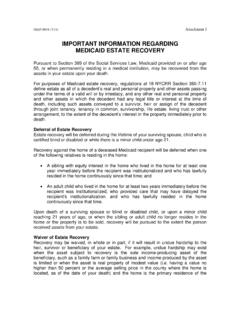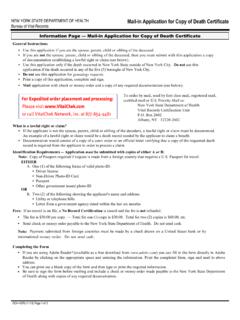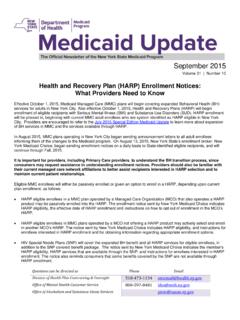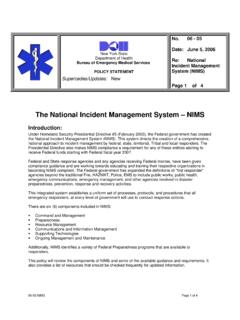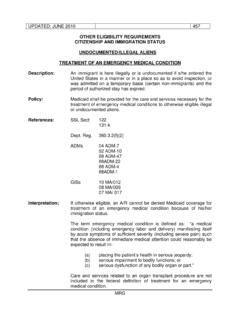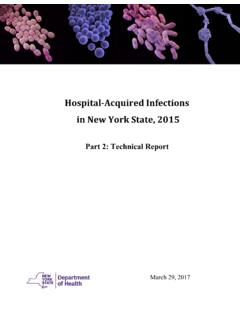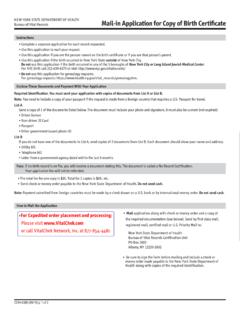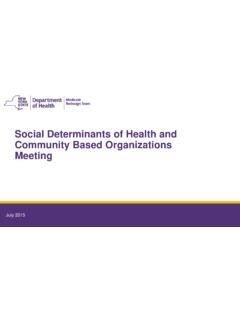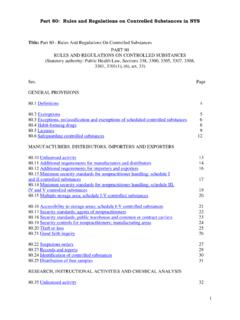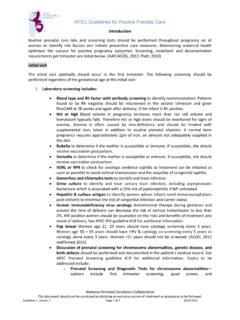Transcription of Preconception Care: A guide for optimizing pregnancy …
1 PreconceptionCareA guide for optimizing pregnancy outcomesThe American College of Obstetricians and Gynecologists, District II/NYThe American College of Obstetricians and Gynecologists recommend that all health encounters during a woman s reproductive years, particularly those that are a part of Preconception care, should include counseling on appropriate health behaviors to optimize pregnancy outcomes and prevent maternal mortality. CheCklIsT Of Preconception CAre TOpICs:education: Smoking, alcohol abuse and other drug use Folic acid supplementation, 400 mcg daily as a standard of careCounseling: Sexually transmitted infections including HIV Family planning and pregnancy spacing Healthy body weight and diet Importance of oral health Increased risk of hepatitis C in those with tattoos and/or body piercings Lead and other environmental and/or occupational exposures Genetic disorders (including cystic fibrosis and sickle cell genotypes)Assessment.
2 Physical assessment including physical examination and medical and family history Carrier screening (racial/ethnic background/family history) Immunization record including rubella, hepatitis B, and varicella Complications with past pregnancies (postpartum hemorrhage, thrombotic event, preeclampsia/eclampsia, PIH, gestational diabetes, Rh incompatibility, etc.) Identification and assistance for victims of domestic violence Psychosocial screening for parent readiness2A. Behavioral .. 4 1. Alcohol Misuse ..4 2. Domestic Violence ..4 3. Drug Abuse ..4 4. Folic Acid ..4 5. Over-the-Counter Medications ..4 6. Prior pregnancy Loss ..5 7. Psychosocial Concerns ..5 8. Smoking ..5B. Chronic 5 1. Asthma ..5 2. 3. Heart Disease ..6 4. Hypothyroidism ..6 5. Obesity ..6 6. Oral Health ..6C. Genetics.
3 7 1. Cystic Fibrosis ..7 2. Maternal Phenylketonurea ..7 3. Sickle Cell Anemia ..7-8 4. Genetic Disorders- European Jewish Descent ..8-9D. Medications .. 9e. sexually Transmitted Infections ..10 1. Bacteriosis Vaginosis ..10 2. Chlamydia ..10 3. Gonorrhea ..10 4. Hepatitis B ..10 5. Hepatitis C ..10 6. HIV ..10 7. Cervical Cytology ..10 8. Syphilis ..10f. Vaccination ..11 1. Human 2. Influenza ..11 3. Rubella Seronegativity ..11 4. AppendicesI. Preconception Care Resources ..14II. Preconception Health Care Synopsis ..15-16 TABle Of CONTeNTs3 Preconception care is defined as a set of interventions that aim to identify and modify biomedical, behavioral and social risks to the woman s health or pregnancy outcome through prevention and management. Certain steps should be taken before conception or early in pregnancy to maximize health outcomes.
4 Consider the following clinical issues. 2A. BehAVIOrAl 1. Alcohol Misuse: Women who are heavy drinkers (five or more drinks on one occasion on five or more days in the past 30 days) have a higher risk of cardiac and hepatic complications. Any amount of alcohol drinking among pregnant women also puts the fetus at risk for fetal alcohol syndrome (FAS). Patients should be informed that prenatal alcohol abuse is a preventable cause of birth defects, including mental retardation and neurodevelopmen-tal defects. It is recommended that women are counseled preconceptionally about these ,42. Domestic Violence: Trauma, either accidental or intentional is the leading cause of death in women of reproductive age. 5 Violence often begins during pregnancy and if it is already present it may escalate and continue through the postpartum period. Screening women at least once in each trimester is recom-mended whenever bruising, improbable injury, or depressed mood is noted.
5 63. Drug Abuse: The use of illicit drugs and alcohol during pregnancy has adverse effects on the neonate, and these children are at risk for altered neu-rodevelopmental outcome and poor health status. Detection and treatment of drugs and alcohol are essential precursors to appropriate therapeutic inter-ventions in the Preconception period. 44. Folic Acid: Neural tube defects (NTDs), such as anencephaly and spina bifida, have multifactorial origins but their etiology often may involve abnormalities in homocysteine metabolism that are potentially remediable by folic acid dietary supplementations. The first occurrence of NTDs may be reduced if women of reproductive age take of folic acid daily both before conception and during the first trimester of pregnancy . 15. Over-the Counter Medications: Talk to your patient about her use of over-the-counter medications, herbal products, vitamins, or nutritional supplements.
6 Certain vitamins in excess are harmful. For example, vitamin A in doses greater than 10,000 international units has been shown to cause severe birth defects when taken during Prior pregnancy Loss: Preconceptional counseling is recommended in women who experienced a prior pregnancy loss. During the Preconception period, investigate the factors that may have contributed to the previous negative outcome and attempt to assuage guilt and help patients resolve any grief from a previous loss. Provide recommendations to the patient that may reduce the chances of pregnancy loss. Also, inform patients realistically about the likelihood of successful future childbearing. 7. Psychosocial Concerns: Psychosocial issues are nonbiomedical factors that affect mental and physical well being. Screening for risk factors may help predict a woman s attentiveness to personal health matters, her use of pre-natal services, and the health status of her offspring.
7 Psychosocial screening should include assessment of risk factors, such as: barriers to care, unstable housing, unintended pregnancy , communication barriers, nutrition, tobacco use, substance use, depression, safety, intimate partner violence, and stress. 8. Smoking: Health risks associated with smoking during pregnancy include intrauterine growth restriction, placenta previa, and abruption placetae. Additionally, adverse pregnancy outcomes may occur including premature rupture of membranes, low birth weight, and perinatal mortality. Smokers of reproductive age should be counseled about the associated risks of smoking and the negative outcomes associated with cessation of tobacco use and prevention of smoking relapse are key clini-cal intervention strategies during Preconception and pregnancy . A 5-15 minute counseling session performed by appropriately trained health care providers is most effective with pregnant women who smoke fewer than 20 cigarettes per day.
8 This intervention, known as the 5 A s, is appropriate for use during routine prenatal office visits and includes the following five steps: Ask, Advise, Assess, Assist, and Arrange. 8B. ChrONIC DIseAses:1. Asthma: Asthma during pregnancy requires special attention and comprehensive treatment. Alterations of doses for certain medications such as corticosteroids may change. Educating patients preconceptionally would be beneficial to the patients pregnancy outcome. Additionally, environmental factors such as allergens (animal dander, house-dust mites, cockroaches, pollens, and indoor molds), tobacco smoke, and indoor/outdoor pollutants (wood-burning stoves of fireplaces, unvented stoves, perfumes, cleaning agents) could exacerbate asthma attacks and should be discussed during Preconception to limit exposures. 952. Diabetes: Preconceptional counseling for women with pregestational diabetes mellitus is beneficial and cost-effective.
9 Preconceptional counsel-ing should focus on the importance of euglycemic control before pregnancy , as well as the adverse obstetric and maternal outcomes that can result from poorly controlled diabetes. An evaluation for underlying vasculopathy is advisable and, in selected patients, may include a retinal examination by an ophthalmologist, a 24-hour urine collection for protein excretion and creatinine clearance, and electrocardiography. Daily multivitamins ontaining at least mg of folic acid are particularly important in women with diabetes given their increased risk of neural tube defects. Higher doses of folic acid may be beneficial in some cases, especially in the presence of other risk factors for neural tube defects. 103. Heart Disease: Women of reproductive age living with heart disease should be counseled about the potential risks associated with pregnancy .
10 Hypertension in pregnancy , specifically preeclampsia and transient hypertension of pregnancy , is associated with increased rates of hypertension and coronary heart disease later in life. 114. Hypothyroidism: Women should be counseled preconceptionally about treatment during pregnancy . Treatment of hypothyroidism in pregnant women is the same as for non-pregnant women and involves administering levothyroxine at sufficient dosages to normalize thyroid-stimulating hormone (TSH) levels. Levothyroxine therapy should be adjusted at four-week intervals until TSH levels are stable. pregnancy increases maternal thyroid hormone requirements in women with hypothyroidism diagnosed before Obesity: Obesity may be defined as a body mass index (BMI) of 30 kg/m2 or greater. 13 Obstetricians should provide Preconception counseling and education about the possible complications and should encourage obese patients to undertake a weight reduction program before attempting pregnancy .
